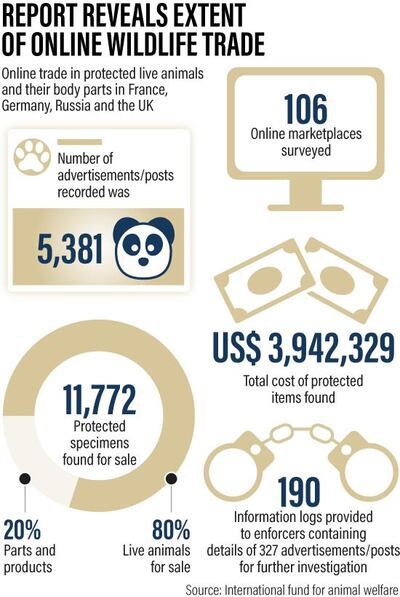Customs officers in Dubai have seized more than 50 endangered species of flora and fauna in three years in a sign of growing action against the region’s illegal animal trade.
Since 2015, Dubai Customs has halted 53 cases of smuggling of contraband listed by the Convention on International Trade in Endangered Species (Cites).
The body parts of big cats and ivory have been some of the most substantial finds at the border, an indication that the illegal trade continues to thrive.
Many are destined for the lucrative Far East black market, with Dubai a popular smuggling route for traffickers.
“Dubai Customs saves no efforts to raise awareness around the importance of protecting these endangered species and abiding by international agreements and treaties in this field,” a spokesman said.
Endangered species, live or mummified, should have permits and documents to ensure owners are not breaking Cites regulations; otherwise they will be prevented from entry to the UAE.
Robin de Bois, a French NGO concerned with endangered wildlife, monitors reports of illegal trafficking around the world.
It has listed several cases involving the UAE in its latest report, that suggests Dubai is a key trafficking thoroughfare.
In November, the manager of a commercial farm in the north west of India was arrested in Dar es Salaam, Tanzania en route to Dubai with a bag loaded with 17 lion claws destined for the black market with an estimated value of $24,000 (Dh88,000).
Three men were arrested in total, shortly before trying to board an Emirates flight to the UAE. The ringleader was ordered to pay a fine of $240,000, or face a 20-year prison sentence.
Lions are facing a growing threat across Africa due to demand for their body parts. Teeth and claws are mainly used as pendants and amulets, sold to satisfy markets in Southeast Asia and China.

Cites prohibits the commercial trade in the parts of wild African lions, although as many as 800 skeletons of captive bred lions are believed to be legally exported from South Africa every year.
Many are destined for Vietnam and Laos, where they are used for treating various ailments or as a substitute for tiger bone wine.
According to Cites, about 150 lion teeth and claws have been exported from South Africa since 2013. There is a similar demand for the body parts of tigers, jaguars and leopards.
All procedures related to wild and pet animals and their entry into the UAE is the responsibility of the Ministry of Climate Change and Environment.
As part of its efforts to protect endangered species, Dubai Customs has partnered with the International Fund for Animal Welfare to train inspectors on how to tackle and prevent smuggling.
Research by the IFAW indicates the scale of the online trade in ivory and suspected ivory remains significant.
In September, two men aged 53 and 54 were sentenced to two months in prison for ivory trafficking in Hong Kong, via Dubai.
The men were arrested after arriving on a flight from Zimbabwe, trying to smuggle 60kg of ivory hidden in four computer processors.
The haul had an estimated black market value of $1.2 million.
Also in September 2017, customs officers in Hong Kong targeted a container from the UAE loaded with 350kg of hammerhead shark fins and oceanic whitetip sharks, valued at $36,000.
In February, officials at Quetta International Airport in Pakistan seized four falcons in a wooden box hidden inside a suitcase belonging to a Pakistani national arriving from Sharjah, with an estimated value of $91,000.
The IFAW's latest report entitled Disrupt: Wildlife Cybercrime, shows the extent of the illicit industry.
Illegal animals were offered for sale in France, Germany, Russia and the UK over a period of six weeks in 2017.
Research identified 11,772 protected wildlife specimens offered for sale via 5,381 advertisements and posts on 106 online marketplaces and four social media platforms, worth approximately US $3,942,329.
The report found 1,288 ivory and suspected ivory specimens offered for sale across 996 advertisements.
_________________
Read more:
Big cats continue to be sold in UAE via social media despite federal law
Industry monitors flag Indonesian hotspot for illegal ape trade
___________________
“We discovered advertisements and posts offering body parts and taxidermy from cheetahs, leopards, lions and tigers and live big cats for sale online,” said Tania McCrea-Steele, project lead of Global Wildlife Cybercrime at the IFAW.
“Shockingly, we also found more than 150 live primates for sale, as well as rhino horn products, ivory and suspected ivory, and elephant feet, skin and hair products — all available to buy over the internet.”
According to the United Nations — Interpol Strategic Report, December 2016, environmental crime is one of the top five largest crime areas globally.
A joint workshop in Lyon, France hosted by IFAW and Interpol this month united wildlife cybercrime experts, academics and tech companies to discuss wildlife crime.
“Interpol’s commitment to tackle wildlife crime takes into consideration the evolving methods by transnational criminal organisations,” said Tim Morris, Interpol Executive Director of Police Services.
“Traffickers take advantage of the lack of control of the supply chain to conceal wildlife parts in trade transportation and shipment or benefit more and more from the use of the internet, both regular and darknet, to avoid the traditional law enforcement oversight.
“We are currently facing the convergence between two developing threats: wildlife trafficking and cyber-enabled crime.”



